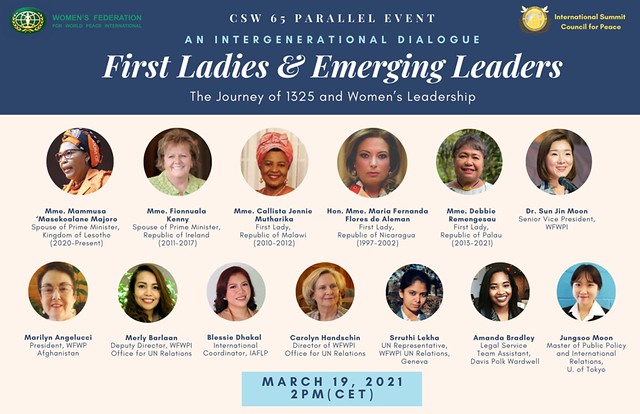New York—UPF’s International Summit Council for Peace (ISCP) and its project International Association of First Ladies for Peace (IAFLP) co-sponsored a parallel event to CSW65.
Women’s Federation for World Peace International (WFWPI), an organization that is affiliated with UPF, holds a parallel event for every session of the United Nations’ Commission on the Status of Women (CSW).
The 65th session of CSW, which took place in March 2021, was held as a virtual event for the first time. Therefore, WFWPI also went online with its March 19 parallel event titled “The Journey of 1325 and Women’s Leadership: An Intergenerational Dialogue between First Ladies and Emerging Leaders.”
(The phrase “Journey of 1325” refers to United Nations Security Council Resolution 1325, on women, peace, and security, which was adopted unanimously by the UN Security Council on October 31, 2000.)
The theme of the CSW65 debates was women’s participation and decision-making in public life. Thousands of concerned citizens, mostly women, weighed in through a vast virtual platform with their expertise, lived experience, challenges, and proposals.
The choice of intergenerational dialogue as the theme of the parallel event was a reaction to what some see as a widening gap between civil society access and influence in the working methods of government at the United Nations. The parallel event brought together two elements that could inspire better understanding and partnership: young aspiring leaders and first ladies.
On February 5, 2020, during World Summit 2020 in Seoul, South Korea, WFWPI co-hosted the inaugural assembly of the International Association of First Ladies for Peace (IAFLP), a project of UPF’s International Summit Council for Peace (ISCP). Being involved with this remarkable event inspired WFWPI, when organizing the CSW65 parallel event, to focus on first ladies.
Moderator Merly Barlaan, the deputy director of the WFWPI UN Office, opened the parallel event. She explained that the interactive dialogue would focus on the “Journey of 1325” and the influence of women’s leadership on protecting rights and delivering justice through mutual cooperation and securing sustainable peace.
“Mammusa” Masekoalane Majoro, the wife of the prime minister of Lesotho (2020-present), offered the opening remarks, touching many hearts when she said, “Raising such a generation of women who possess confidence to make it on their own, without subjecting themselves to abuse, is a mission worth dying to give birth to.”
Dr. Sun Jin Moon, the senior vice president of WFWPI and founder of Giving for Good International, delivered the opening address. Citing alarming statistics related to the COVID pandemic and climate change, she reminded the audience that, while remaining aware of the challenges, we must be able to reach for the higher consciousness where the seeds of hope can flourish and where women’s input is essential.
IAFLP Chair Blessie Dhakal introduced the first ladies, each of whom offered a few personal remarks:
- Fionnuala Kenny, wife of the prime minister of Ireland (2011-2017)
- Callista Mutharika, first lady of Malawi (2010-2012) and member of Parliament
- Maria Flores de Alemán, first lady of Nicaragua (1997-2002) and National Assembly member.
Next, three young women leaders were introduced:
- Srruthi Lekha, UN representative for peacebuilding and youth leadership at the WFWPI UN Office in Geneva, Switzerland
- Amanda Bradley, a business development executive assistant at the international law firm Davis Polk & Wardwell
- Jungsoo Moon, who holds a master’s degree in public policy and international relations from the University of Tokyo.
Combining spontaneity, knowledge and experience, the second part of the session was a roundtable discussion among the first ladies and the younger participants. Several guiding questions allowed the speakers to respond with profound and personal insights:
- What are the challenges to women’s empowerment, and what is needed to encourage more women in your nation to take up public leadership?
- How could education influence the implementation of UN Security Council Resolution 1325?
- How has Resolution 1325 influenced women and girls in your country, and what is still needed to end discrimination and prevent violence and abuse?
The interactive discussions were so engaging that they were extended for another 20 minutes.
Carolyn Handschin, the director of the WFWPI Office for UN Relations, closed the session with a reminder: “[The lives of] the women who came from all over the world to Beijing 26 years ago [the 1995 Beijing Declaration and Platform for Action] … were changed by listening to one another and realizing that they share similar dreams and goals that they would retell to their daughters, friends and colleagues. This meeting today brings in that additional factor—a critical and potentially very enjoyable one—of intergenerational listening, trust-building and partnership on the path of peace.”
The recording of the session can be found at https://vimeo.com/528951396

